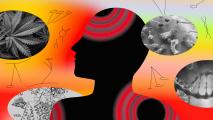
The Digital Frontier
30 years ago, the Internet opened up a new frontier, and today we’re all citizens of a digital Wild West, where how we live, work and govern is changing everyday.
More
From robotic dogs to magnetic slime: 6 ways robots are helping humans
Robots are helping humans in a growing number of places – from archaeological sites to disaster zones to sewers.
Google Maps’ “Immersive View” shows cities in a whole new way
Combining satellite and Street View images, Google Maps’ “immersive view” will let you explore select neighborhoods soon.
End-of-life planning app helps you prepare for mortality
End-of-life planning app Bereev helps you prepare for your death so that your loved ones will be able to focus on grieving after you pass.
Avatar 2: How much has CGI really improved since 2009?
Some critics say CGI has actually gotten worse. Here’s why it’s not so simple.
Neuralink rival will soon test brain implant in US clinical trials
It’s the first time the FDA has approved clinical trials for a brain-computer interface.
Should we build high-speed public WiFi into street lights?
Better public WiFi networks could be created by broadcasting signals over the 60 GHz frequency band from transmitters attached to light poles.
Google Career Certificate programs are now free for US businesses
Google has announced a new Career Certificate program and a plan to give any US business $100,000 in free tech training.
A new kind of diamond will hold a billion Blu-Ray’s worth of data
Ultra-pure diamond wafers could be used for quantum memory in tomorrow’s ultra-powerful quantum computers.
This wristband tells you what food to buy based on your DNA
By analyzing genetic code determining susceptibility to health conditions like diabetes, it tells you which foods are best for you.
What will happen if Elon Musk does buy Twitter? (Updated)
Billionaire Elon Musk is trying to buy Twitter, and if successful, he plans to make several major changes to the social media giant.
People trust AI fake faces more than real ones, research suggests
Fake faces created by artificial intelligence (AI) are considered more trustworthy than images of real people, a study finds.
Psychedelics, brain implants, and the future of chronic pain relief
The future of chronic pain relief could include psychedelics, gene therapies, brain implants, and other cutting-edge alternatives to opioids.
Behind the crypto hype is an ideology of social change
Unlike technology enthusiasts or crypto marketers, “true bitcoiners” didn’t talk about technology, but trust and corruption.
Metaverse real estate prices are booming. This is why.
People are paying millions of dollars to buy plots of pixellated land in virtual worlds, even though they doesn’t fully exist yet.
How Ukraine has defended itself against cyberattacks – lessons for the US
Russian hackers stepped up their efforts against Ukraine in the run-up to the 2022 invasion, but with notably different results.
In a hole in Earth’s magnetic field, neuroscientists are peering into the human brain
By using quantum physics to measure magnetic fields, researchers are pushing closer to measuring the brain in ways we couldn’t before.
Credit card-sized device focuses terahertz energy to generate high-resolution images
The advance may enable real-time imaging devices that are smaller, cheaper, and more robust than other systems.
Computer scientists explain how to stop smart devices from spying on you
“Smart” appliances tempt you with useless conveniences, but myriad privacy violations lie just beneath their shiny exterior.
Blockchain experts are funding research that Big Pharma won’t
Decentralized autonomous organizations (DAOs) use smart contracts on blockchains to change how scientific research is funded and shared.
What is 3G and why is it being shut down? An electrical engineer explains
3G networks are built using completely different equipment and algorithms than its newer replacements.
Get inspired with the most innovative stories shaping the world around us.





















